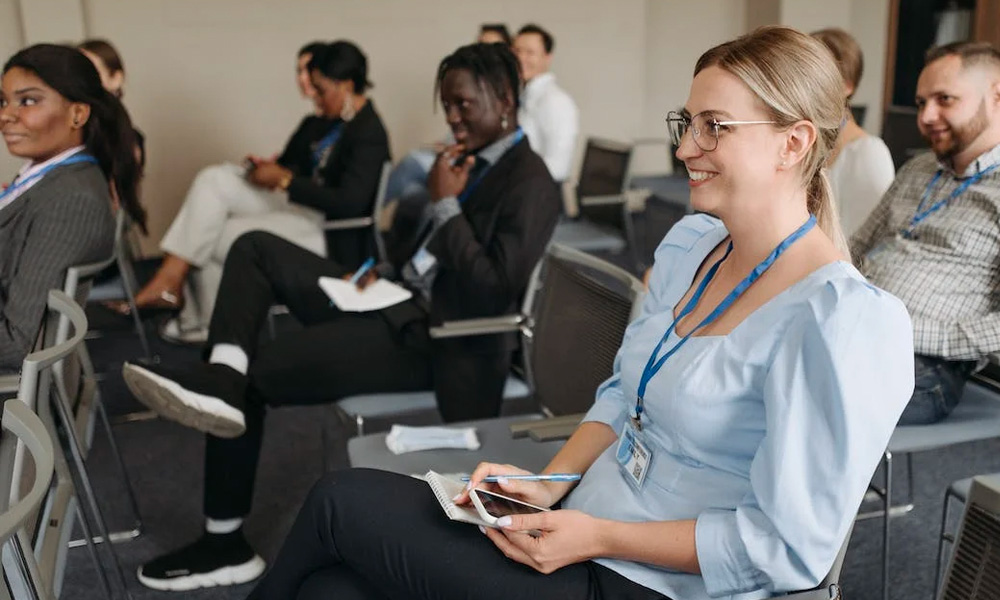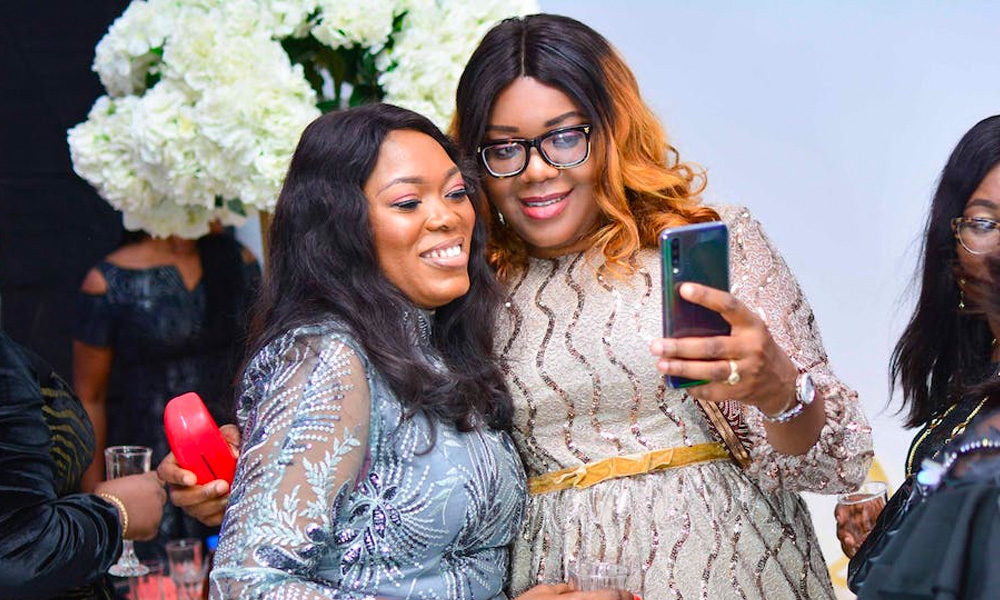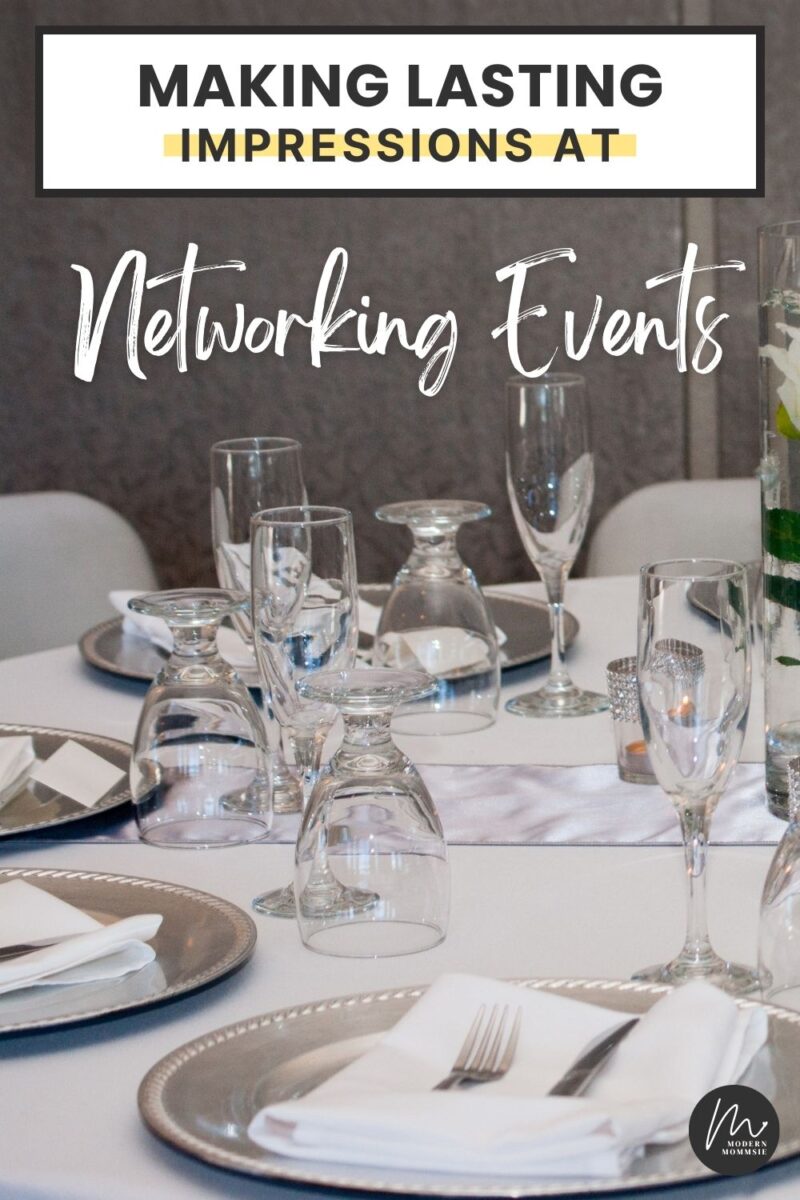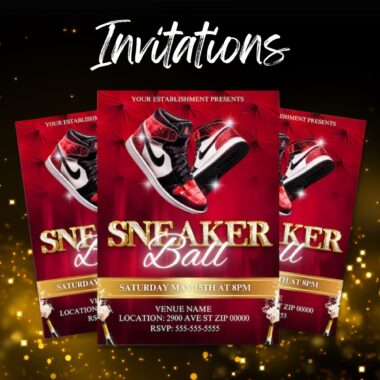This website contains affiliate links. If you purchase a product using these links, I receive a small commission at no extra cost to you.
A networking event can be the golden ticket to advancing your career, building invaluable connections, and uncovering opportunities you never knew existed.
Whether you’re a seasoned professional or just starting out in your career, understanding the nuances of a networking event can transform it from an otherwise daunting task into an exciting, productive – and, dare I say – enjoyable experience.
Let’s dive into the art of networking and unlock the secrets to making the most of these career-changing events.
What is a Networking Event?
A networking event is a gathering where professionals from various industries meet to connect, exchange ideas, and build relationships that can lead to career growth and business opportunities.
It’s an essential tool for professional development, offering a unique chance to meet key influencers, gather industry insights, and uncover potential job or collaboration opportunities.
Keep reading to discover how you can leverage these events to propel your career to new heights, making deeper connections all while making a name for yourself.
How Can I Find Networking Events Near Me?
Finding networking events in your area can be a straightforward process if you know where to look. One of the most effective ways is through professional organizations and clubs related to your field. These entities regularly organize events for their members and are a goldmine for networking opportunities. Additionally, your local Chamber of Commerce is an invaluable resource for alumni networking events, frequently hosting business-related events in your community.
In the digital age, online platforms play a crucial role in discovering and hosting networking events. Websites and apps like Eventbrite, Meetup, and LinkedIn Events offer a plethora of options, allowing you to filter events by location, industry, and type.
Social media platforms are also instrumental in this regard. Following industry leaders, companies, and professional groups on LinkedIn, Twitter, and Facebook can keep you informed about upcoming networking events.
Don’t overlook the power of community and alumni connections. College and University alumni associations are often involved in organizing networking events, which can be particularly beneficial for making connections in your field.
Coworking spaces in your area are another great avenue, as they frequently host networking events fun for their members and sometimes for the wider public.
Moreover, keep an eye on community bulletin boards in places like libraries, community centers, or local coffee shops. They might have flyers or information about upcoming local events.
Similarly, word of mouth is a powerful tool; colleagues, mentors, or friends in your industry can be excellent sources of information about networking opportunities.
Lastly, subscribing to newsletters and magazines relevant to your profession can keep you updated on industry events. These publications often advertise or write about upcoming and virtual networking events and opportunities, providing you with a comprehensive overview of events that might be of interest.
By leveraging these various resources and actively seeking out networking opportunities, you’ll be well-equipped to find workshops, seminars, conferences, and other networking events that align with your professional interests and goals, right in your local area.
Types of Networking Events
Networking events come in various formats, each with a unique atmosphere and opportunities for making connections.

Here’s a list of common types of networking events:
- Industry Conferences: Large gatherings focused on specific industries, featuring speakers, panels, and workshops, where professionals can connect, learn, and discuss industry trends.
- Business Mixers: Informal social gatherings, often held in relaxed settings like bars or restaurants, where professionals from various industries can mingle and network.
- Trade Shows: Events where businesses in a particular industry display and demonstrate their latest products and services. Great for B2B networking.
- Professional Association Meetings: Regularly scheduled meetings of members of a professional association, offering networking opportunities alongside discussions or presentations.
- Seminars and Workshops: Educational events focused on a specific topic, where attendees can learn new skills and network with others who have similar interests.
- Job Fairs: Events aimed at connecting job seekers with potential employers. These can be industry-specific or more general.
- Speed Networking Events: Modeled after speed dating, these events allow participants to meet a large number of people in a short time, usually with a few minutes to converse with each person.
- Alumni Events: Gatherings organized by universities or colleges for their alumni, providing a platform for former students to connect professionally.
- Chamber of Commerce Events: Local business events organized by the Chamber of Commerce to promote networking and collaboration among businesses in the community.
- Roundtable Discussions: Small, informal group discussions on specific topics, allowing for in-depth conversation and connection with like-minded professionals.
- Corporate Retreats: Organized by companies for their employees, often featuring team-building activities and opportunities for networking within the organization.
- Online Networking Events: Virtual events conducted over platforms like Zoom or LinkedIn, catering to remote professionals and offering wider accessibility.
- Charity Galas and Fundraisers: Social events with a philanthropic focus, providing a high-end setting for networking while supporting a good cause.
- Startup Pitch Events: Where entrepreneurs present their business ideas to potential investors, partners, and other stakeholders in the startup community.
- Breakfast Meetings and Luncheons: Networking events organized around meals, offering a more intimate setting for business conversations.
Each type of networking event offers unique opportunities and atmospheres, so it’s beneficial to attend a variety to see which suits your networking style and goals the best.
The Power of First Impressions at Networking Events
When you step into a networking event, you’re not just a participant; you’re a brand ambassador for “You Inc”. First impressions are crucial. Dress to impress, but also dress for the occasion. If it’s a formal business networking event, suit up. If it’s more casual, smart-casual attire is your best bet. You want to be remembered for your professionalism, not your fashion faux pas.
A firm handshake, a warm smile, and an engaging introduction are your first tools in the networking toolbox. Have a brief, snappy introduction ready. It should encapsulate who you are, what you do, and what you bring to the table. Think of it as your personal pitch at the networking event.

Making a good impression at a networking event is crucial for establishing valuable connections. Here are some effective ways to ensure you leave a positive and lasting impact:
- Dress Appropriately: Wear attire that is suitable for the event’s setting. Dressing well, but also comfortably, shows professionalism and respect for the occasion.
- Prepare an Elevator Pitch: Have a short, engaging introduction ready that succinctly describes who you are, what you do, and what you’re looking for. This helps set the stage for meaningful conversations.
- Arrive on Time: Punctuality demonstrates reliability and respect for others’ time. Arriving early also gives you a chance to settle in before the crowd.
- Be Approachable and Positive: Smile and maintain an open body language. A positive demeanor makes you more approachable and creates a welcoming atmosphere for others.
- Listen Actively: Show genuine interest in what others have to say. Active listening demonstrates that you value their opinions and insights.
- Ask Insightful Questions: Engage in conversations by asking relevant and thoughtful questions. This not only shows your interest but also your knowledge and insight into the topic.
- Offer Help or Advice When Appropriate: If you can provide assistance or useful information, do so. Helping others can leave a strong, positive impression.
- Use Names in Conversation: Remember and use people’s names during your discussion. It adds a personal touch and shows attentiveness.
- Be Authentic: Be yourself. Authenticity builds trust and helps form stronger, more genuine connections.
- Mind Your Body Language: Non-verbal cues like a firm handshake, eye contact, and smiling can significantly impact how you’re perceived.
- Avoid Dominating Conversations: Allow for a balanced exchange. Dominating a conversation can be off-putting to others.
- Follow-Up Post-Event: Send a personalized message or email after the event to strengthen the connections you’ve made.
- Stay Off Your Phone: Engage with the people around you instead of being absorbed in your phone. Being present in the moment is crucial for effective networking.
- Know When to Exit a Conversation: Politely excuse yourself from conversations that are not productive or have run their course, allowing you to meet more people.
- Stay Positive and Enthusiastic: Positivity is contagious and can leave a memorable impression.
By incorporating these tips, you can significantly enhance your networking skills and make a lasting good impression at any networking event.
Navigating the Room Like a Pro
At any networking event, the room is your oyster, and how you navigate it can make all the difference. Don’t be the wallflower waiting for someone to approach you. Take the initiative. Look for open groups or individuals standing alone. They’re likely seeking someone to talk to as well and will likely breathe a sigh of relief once you walk over!
When you join a conversation, listen as much as you speak. The best networkers are those who show genuine interest in others. Ask open-ended questions that encourage people to talk about themselves and their work. A successful networking event is as much about learning from others as it is about sharing your own story.
Making Meaningful Connections
The essence of a networking event lies in building connections, not just collecting business cards. Aim for quality over quantity. It’s better to have five meaningful conversations than to flit around the room without engaging deeply with anyone.
When you find a common ground with someone, explore it. This could be a shared interest, a mutual acquaintance, or a similar challenge in your industries. These touchpoints create a bond and make your interaction memorable.

Following-Up: The Key to Long-Term Networking Success
The real magic of a great networking event ideas what happens in the follow-up. Within 24-48 hours after the event, reach out to the people you connected with. A personalized email or LinkedIn message can go a long way. Mention something specific from your conversation to jog their memory and suggest a concrete next step, like a coffee meet-up or a call.
Don’t just reach out once and forget. Building a network is about nurturing relationships over time. Regular check-ins, sharing relevant articles, or congratulating them on professional achievements keeps the connection alive and genuine.
Reaching out to new connections after a networking event is a crucial step in building lasting professional relationships. Here are some effective ways to do so:
- Personalized Email: Send a personalized email within 24-48 hours of the event. Reference specific topics discussed during your conversation to jog their memory and establish a connection.
- LinkedIn Connection Request: Connect on LinkedIn with a personalized message. Mention where you met and what you enjoyed about your conversation. This platform is also great for staying updated on their professional achievements and sharing relevant content.
- Follow-Up Call or Meeting Invitation: If the conversation at the event was particularly promising, suggest a follow-up call or a coffee meeting to continue the discussion. This shows genuine interest in developing the relationship.
- Social Media Engagement: Follow their professional social media profiles and engage with their content. Commenting on or sharing their posts can keep the interaction going and show your interest in their work.
- Offer Value: If you come across an article, event, or opportunity relevant to their interests or industry, share it with them. Providing value is a great way to strengthen the connection.
- Thank You Note: If they offered advice, a referral, or valuable insights during your conversation, sending a brief thank-you note can be a thoughtful gesture.
- Regular Check-Ins: Periodically check in with your new connections, even if it’s just to say hello or share a brief update. This helps keep the relationship active and shows that you value the connection.
By utilizing these approaches and large groups networking ideas, you can effectively reach out to and maintain the new connections you’ve made, potentially opening doors to future opportunities and collaborations.
Leveraging Social Media Before and After the Event
Social media can be a powerful tool in your networking arsenal. Before the networking event, use platforms like LinkedIn or Twitter to announce your attendance and connect with other event attendees beforehand. It can set the stage for face-to-face interactions.
After the event, use social media to continue the conversation. Share your learnings or experiences from the event and tag the people or organizations involved. It’s a great way to stay visible and relevant in your network.
Handling Networking Challenges Gracefully
Not every interaction at a networking event will be a home run, and that’s okay. If you find yourself in a conversation that’s not going anywhere, it’s perfectly fine to politely excuse yourself. You can say something like, “It was great chatting with you. I see someone I need to catch up with, but let’s connect on LinkedIn.”
Similarly, if you’re feeling overwhelmed or out of your element, take a breather. Step outside for some fresh air or grab a coffee. Networking is a marathon, not a sprint. You need to be in the right mindset to make the most of it.
The Art of Listening and Learning
Remember, a networking event is as much about listening as it is about speaking. Everyone has a story or knowledge that you can learn from. Be curious, ask questions, and listen actively. This not only shows respect but also helps you understand their needs and how you might be able to help them – which, in turn, strengthens your connection.

Listening effectively is a key skill for successful networking. Here are some tips to help you listen better at a networking event:
- Maintain Eye Contact: Show you are engaged and interested by maintaining eye contact with the speaker. It conveys respect and attentiveness.
- Be Present in the Moment: Avoid distractions. Put away your phone and focus on the conversation. This helps in understanding and remembering the details of what’s being said.
- Nod and Show Engagement: Use non-verbal cues like nodding or smiling to show you are following along and appreciate what the speaker is saying.
- Avoid Interrupting: Let the speaker finish their thoughts before you respond. Interrupting can seem rude and implies you’re more interested in speaking than listening.
- Ask Open-Ended Questions: Encourage the speaker to elaborate by asking questions that can’t be answered with a simple ‘yes’ or ‘no’. This shows genuine interest in their perspective.
- Paraphrase to Show Understanding: Occasionally, summarize or paraphrase what the speaker has said to ensure you’ve understood correctly. This also demonstrates active engagement.
- Practice Empathetic Listening: Try to understand the speaker’s feelings and viewpoints. This creates a deeper connection and makes the conversation more meaningful.
- Be Mindful of Body Language: Your body language should convey openness and interest. Avoid crossing your arms or looking away from the speaker.
- Limit Your Own Talking: Remember, listening is about the other person. Resist the urge to dominate the conversation or steer it towards your own interests.
- Take Mental Notes: Remember key points or interesting facts about the speaker. This can be useful for future interactions and shows you value the conversation.
- Avoid Planning Your Response While Listening: Focus fully on what’s being said rather than preparing your next comment in your head. This ensures you don’t miss important details.
- Follow Up on Key Points: After the speaker finishes, bring up specific details they mentioned. This indicates that you were attentively listening.
By incorporating these listening strategies in person too, you’ll not only make a great impression at networking events but also build more meaningful and productive connections.
Becoming a Virtual Virtuoso
Making a lasting impression during a virtual event requires a blend of technical savvy, active participation, and personal charisma. Here’s how you can stand out:
- Professional Virtual Setup: Ensure your camera and audio are of good quality. Choose a clean, professional background, or use a tasteful virtual background. Good lighting is also crucial.
- Engage Actively: Participate in discussions, ask insightful questions, and contribute valuable points during Q&A sessions. Being actively involved shows your interest and expertise.
- Effective Presentation: If you’re presenting, ensure your slides are clear and engaging. Practice your speech to be confident and concise. A well-delivered presentation can leave a memorable impression.
- Use the Chat Feature Wisely: Utilize the chat function to contribute to the discussion or to respond to other participants’ comments. Be professional and relevant in your chat interactions.
- Follow Proper Online Etiquette: Mute yourself when not speaking to avoid background noise. Be attentive and avoid multitasking, as it can be visible and distracting to others.
- Follow Up Post-Event: Reach out to participants or speakers after the event via email or LinkedIn. Mention specific discussions from the event to personalize your message.
- Profile Optimization: Before the event, optimize your LinkedIn or other professional profiles. Participants may view your profile, so ensure it reflects your professional brand effectively.
- Share Your Insights: Post-event, share your takeaways or insights on social media or professional networks. Tag the event or speakers to extend your reach and show engagement.
- Network Virtually: Reach out to other attendees for virtual coffee or networking chats. This can help build relationships initiated during the event.
- Be On Time: Log in a few minutes early to troubleshoot any technical issues and be ready when the event starts.
By combining professionalism with active engagement and follow-up, you can create a lasting impression even in a virtual setting, opening doors to future opportunities and connections.
Wrapping It Up
In conclusion, mastering networking events is about combining preparation, engagement, and follow-through. It’s about being genuine, showing interest in others, and building relationships that extend beyond the event itself. Keep these tips in mind, and you’ll turn every networking event into a fruitful endeavor.
Remember, networking is an investment in your professional future. It’s not always about immediate returns but about planting seeds that can grow into opportunities down the line. So, gear up, step out, and make your next networking event a stepping stone to greater success.
Frequently Asked Questions
What should I do if I feel nervous about attending a networking event? Feeling nervous is normal, especially for first-timers. Prepare a brief introduction about yourself, set realistic goals for the number of people you want to meet, and remember, many attendees are likely feeling the same way.
How can I identify key people to network with at an event? Research the event beforehand to know who’s attending. Look for industry leaders, potential mentors, or peers with shared interests. Use social media like LinkedIn to familiarize yourself with their profiles and work.
Is it appropriate to follow up with someone I met at a networking event? Absolutely! Following up is crucial. Send a personalized email or LinkedIn message within 48 hours, referencing specific topics you discussed. This demonstrates your interest and helps forge a stronger connection.
Can I attend a networking event even if I’m not looking for a job? Yes, networking events are not just for job seekers. They’re opportunities to learn, find mentors, and build relationships that can benefit your career in the long term, regardless of your current employment status.
How do I exit a conversation gracefully at a networking event? To exit a conversation, politely express your appreciation for the chat, mention your intention to meet others or participate in another aspect of the event, and suggest keeping in touch if appropriate. This keeps the interaction positive and open-ended.







